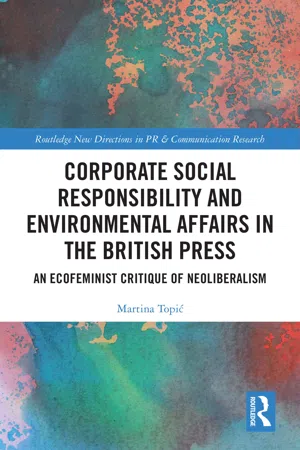
Corporate Social Responsibility and Environmental Affairs in the British Press
An Ecofeminist Critique of Neoliberalism
- 226 pages
- English
- ePUB (mobile friendly)
- Available on iOS & Android
Corporate Social Responsibility and Environmental Affairs in the British Press
An Ecofeminist Critique of Neoliberalism
About this book
An ecofeminist criticism of neoliberalism, this book uses economic growth, CSR and the press coverage of environmental affairs as a case study. The author argues that CSR is part of a wheel of neoliberalism that continually perpetuates inequality and the exploitation of women and Nature. Using an ecofeminist sense-making analysis of media coverage of food waste, global warming, plastic, economic growth and CSR, the author shows how the press discourse in writing is always similar and serves to preserve the status quo with CSR being just a smokescreen that saved capitalism and just one cog in the wheel of neoliberalism. While available research offers perspectives from business and public relations studies, looking at how CSR is implemented and how it contributes towards the reputation of businesses, this book explores how the media enforce CSR discourse while at the same time arguing for environmental preservation.
The book presents a combination of quantitative and qualitative methods to explain how and why CSR is being pushed forward by the news media, and how the media preserves the status quo by creating moral panic on environmental issues while at the same time pushing for CSR discourse and economic growth, which only contributes towards environmental degradation. The original research presented in the book looks at how the media write about economic growth, plastics, food waste, CSR and global warming. This interdisciplinary study draws on ecofeminist theory and media feminist theory to provide a novel analysis of CSR, making the case that enforcing CSR as a way to do business damages the environment and that the media enforce a neoliberal discourse of promoting both economic growth and environmentalism, which does not go together.
Examining the UK media as a case study, a detailed methodological account is provided so that the study can be repeated and compared elsewhere. The book is aimed at academics and researchers in business and media studies, as well as those in women's studies. It will also be relevant to scholars in business management and marketing.
Frequently asked questions
- Essential is ideal for learners and professionals who enjoy exploring a wide range of subjects. Access the Essential Library with 800,000+ trusted titles and best-sellers across business, personal growth, and the humanities. Includes unlimited reading time and Standard Read Aloud voice.
- Complete: Perfect for advanced learners and researchers needing full, unrestricted access. Unlock 1.4M+ books across hundreds of subjects, including academic and specialized titles. The Complete Plan also includes advanced features like Premium Read Aloud and Research Assistant.
Please note we cannot support devices running on iOS 13 and Android 7 or earlier. Learn more about using the app.
Information
1 Introduction and personal reflection
the late 20th century crises – social and environmental – are inevitable because of “masculine” values and behaviours. The keystone of this destructive patriarchalism is identified in the everyday notion that men represent the sphere of “humanity and culture”, while women, indigenes, children, animals, plants, and so on, are part of “nature” […] Ecofeminists focus on the dominant Eurocentric industrial capitalist patriarchal formation and its material impacts.Salleh (2001a, p. 109, emphasis in original; see also Salleh, 2000; Waldron, 2003; Sydee & Beder, 2001)
Table of contents
- Cover
- Half Title
- Series Page
- Title Page
- Copyright Page
- Table of Contents
- List of illustrations
- About the author
- Acknowledgements
- 1 Introduction and personal reflection
- 2 Ecofeminism: theory, issues and advocacy
- 3 Corporate social responsibility: an ecofeminist reading of the concept
- 4 The press coverage of economic growth and CSR
- 5 The press coverage of environmental affairs: global warming, plastic and the food waste
- 6 The wheel of neoliberalism and the responsibility of the press
- References
- Index